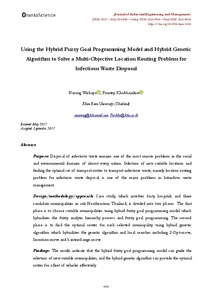Mostra el registre d'ítem simple
Using the hybrid fuzzy goal programming model and hybrid genetic algorithm to solve a multi-objective location routing problem for infectious waste disposal
| dc.contributor.author | Wichapa, Narong |
| dc.contributor.author | Khokhajaikiat, Porntep |
| dc.date.accessioned | 2017-12-04T11:54:27Z |
| dc.date.available | 2017-12-04T11:54:27Z |
| dc.date.issued | 2017-11 |
| dc.identifier.citation | Wichapa, N.; Khokhajaikiat, P. Using the hybrid fuzzy goal programming model and hybrid genetic algorithm to solve a multi-objective location routing problem for infectious waste disposal. "Journal of Industrial Engineering and Management", Novembre 2017, vol. 10, núm. 5, p. 853-886. |
| dc.identifier.issn | 2013-0953 |
| dc.identifier.uri | http://hdl.handle.net/2117/111532 |
| dc.description.abstract | Purpose: Disposal of infectious waste remains one of the most serious problems in the social and environmental domains of almost every nation. Selection of new suitable locations and finding the optimal set of transport routes to transport infectious waste, namely location routing problem for infectious waste disposal, is one of the major problems in hazardous waste management. Design/methodology/approach: Due to the complexity of this problem, location routing problem for a case study, forty hospitals and three candidate municipalities in sub-Northeastern Thailand, was divided into two phases. The first phase is to choose suitable municipalities using hybrid fuzzy goal programming model which hybridizes the fuzzy analytic hierarchy process and fuzzy goal programming. The second phase is to find the optimal routes for each selected municipality using hybrid genetic algorithm which hybridizes the genetic algorithm and local searches including 2-Opt-move, Insertion-move and ?-interchange-move. Findings: The results indicate that the hybrid fuzzy goal programming model can guide the selection of new suitable municipalities, and the hybrid genetic algorithm can provide the optimal routes for a fleet of vehicles effectively. Originality/value: The novelty of the proposed methodologies, hybrid fuzzy goal programming model, is the simultaneous combination of both intangible and tangible factors in order to choose new suitable locations, and the hybrid genetic algorithm can be used to determine the optimal routes which provide a minimum number of vehicles and minimum transportation cost under the actual situation, efficiently. |
| dc.format.extent | 34 p. |
| dc.language.iso | eng |
| dc.publisher | OmniaScience |
| dc.rights | Attribution-NonCommercial 3.0 Spain |
| dc.rights.uri | http://creativecommons.org/licenses/by-nc/3.0/es/ |
| dc.subject | Àrees temàtiques de la UPC::Economia i organització d'empreses::Direcció d'operacions |
| dc.subject.lcsh | Multiple criteria decision making |
| dc.subject.lcsh | Refuse and refuse disposal |
| dc.subject.lcsh | Infectious wastes |
| dc.subject.other | Multi-objective facility location problem |
| dc.subject.other | Fuzzy analytic hierarchy process |
| dc.subject.other | Fuzzy goal programming model |
| dc.subject.other | Hybrid genetic algorithm |
| dc.subject.other | Infectious waste disposal |
| dc.subject.other | Multi-criteria decision making |
| dc.subject.other | Location routing problem |
| dc.title | Using the hybrid fuzzy goal programming model and hybrid genetic algorithm to solve a multi-objective location routing problem for infectious waste disposal |
| dc.type | Article |
| dc.subject.lemac | Decisió multicriteri |
| dc.subject.lemac | Residus -- Eliminació |
| dc.subject.lemac | Residus infecciosos |
| dc.identifier.doi | 10.3926/jiem.2353 |
| dc.identifier.dl | B-28744-2008 |
| dc.description.peerreviewed | Peer Reviewed |
| dc.rights.access | Open Access |
| local.citation.publicationName | Journal of Industrial Engineering and Management |
| local.citation.volume | 10 |
| local.citation.number | 5 |
| local.citation.startingPage | 853 |
| local.citation.endingPage | 886 |


